The Wild Side of Wrong - Five Animal Adventures You Should Never Book
Not every wildlife experience in South Africa is truly wild.
From cuddling lion cubs to diving with baited sharks, some of the most popular animal attractions are built on broken ethics — and broken animals. They may promise thrills, education, even conservation... but too often, it's just exploitation in disguise.
This August, we're pulling back the curtain.
Each week, we'll expose one harmful animal tourism trap — and show you the better, ethical alternative. Because when you truly love the wild, you don't pet it, pose with it, or ride it. You protect it.
Here's what's coming:
- 🦁 The Lion Lie – Why petting cubs supports canned hunting
- 🦈 Bait & Switch – The truth behind baited shark dives
- 🐘 The Elephant in the Room – The suffering behind elephant rides
- 📸 Selfie Stress – Why cheetah encounters are pure exploitation
- 🎭 Wild Shows, Trapped Lives – Animal performances built on cruelty
Let's learn, unlearn, and do better — together.
For a wildlife-loving South Africa that stays truly wild. 🐾
The Lion Lie: Why Petting Cubs Isn't Cute
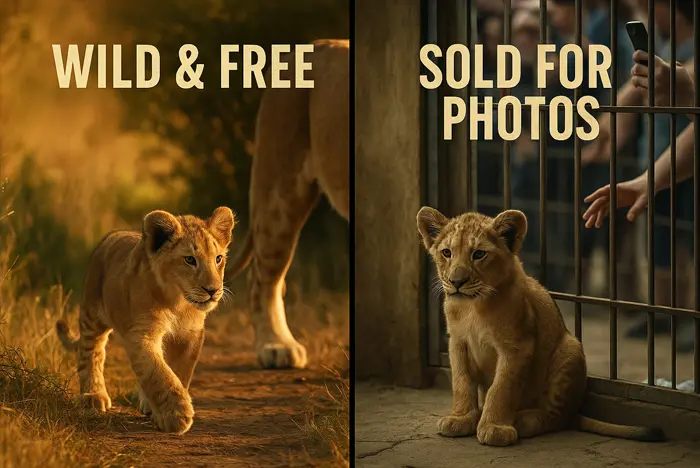
They purr like kittens, look like plush toys, and pose like influencers. Lion cubs — the darlings of many a South African safari selfie. But behind every cuddly photo is a darker truth. One that's been hidden in plain sight for too long.
This is the story of how the cutest encounter in the wild becomes one of the cruelest.
You arrive at a wildlife park. You see the cubs, you're told they were orphaned. You pay, pet, bottle-feed — even walk beside them. You leave feeling moved, enchanted.
But the truth is: most of these cubs were bred in captivity, ripped from their mothers within days to become props in a tourist's daydream. These facilities often claim conservation motives — but there's no plan to release these animals. Only to profit from them.
Once they grow too big for selfies, their journey gets even darker.
When cubs become adolescents, they're no longer profitable to pet. Many are sold off to canned hunting operations — fenced enclosures where trophy hunters pay to shoot lions with no chance of escape.
This pipeline — from petting zoo to gun barrel — is one of South Africa's dirtiest secrets. Over 8,000 lions are kept in captivity across the country. Less than 3,000 remain in the wild.
Every paid cuddle is another link in a heartbreaking chain.
The good news? True sanctuaries exist — like the Drakenstein Lion Park, which offers lifelong care to rescued lions without breeding or petting.
Even better: visit one of South Africa's incredible national parks. See lions from a distance, living as they were meant to — wild, proud, and free.
If you can touch it, it's not wild anymore.
Bait & Switch: The Shark Cage Illusion
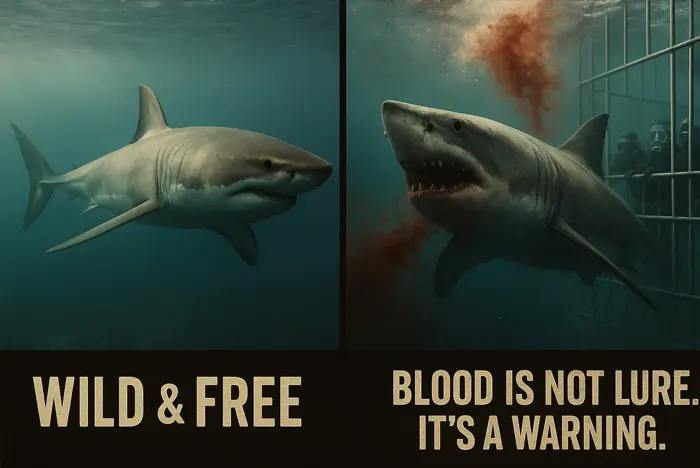
The boat rocks gently. You slip into the cage. The water churns. Suddenly — a flash of silver, rows of teeth, raw power in motion. Adrenaline spikes. Cameras roll.
But what if the drama you came for wasn't natural at all?
What if your thrill came at the ocean's expense?
Shark cage diving has become a headline attraction along South Africa's coast — especially in Gansbaai and Mossel Bay. But to guarantee a show, many tour operators use baiting: tossing fish guts and blood into the sea to lure great whites right up to the cage.
It makes for heart-racing footage. It also rewires wild behavior.
Sharks begin to associate boats and humans with food. Their hunting zones shift. And nature, finely balanced, starts to tip.
While baited shark diving isn't technically illegal, it's controversial for good reason.
Studies have shown that frequent baiting disrupts migratory routes, increases shark aggression near shores, and risks making apex predators reliant on handouts.
Meanwhile, tourists leave thinking they've had a real encounter with a "killer." But the real danger is the one we leave behind — a distorted ecosystem.
There are ethical shark experiences in South Africa. Some operators use non-baited techniques, relying on skill and timing rather than manipulation.
You can also witness shark behavior responsibly from boats, coastal lookouts, or by supporting marine research.
The best wildlife experiences? They happen on nature's terms, not ours.
The Elephant in the Room: Saddled with Suffering
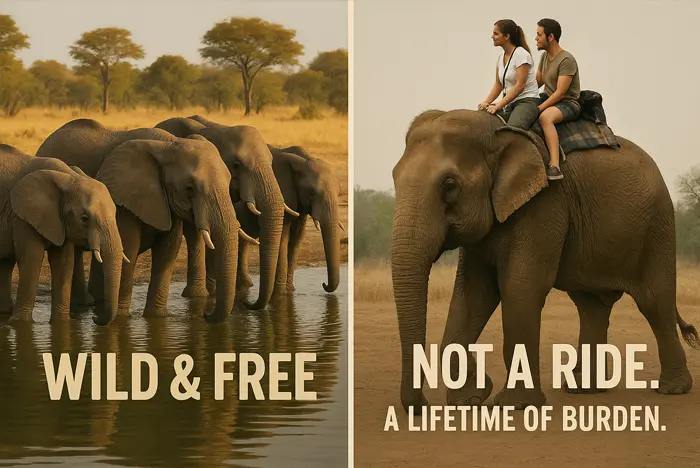
You climb up. The elephant sways beneath you. It feels majestic, even magical. A once-in-a-lifetime moment, they say.
But behind those long lashes and ancient eyes, there's a lifetime of pain.
This isn't a fairytale. It's forced labor in a wild disguise.
Elephant-back safaris are still offered in parts of South Africa and neighboring countries. The pitch? A gentle giant, guided by a mahout, showing you the wild from a lofty seat.
But the only reason that elephant lets you ride it is because its spirit was broken long ago.
The training process — often called "the crush" — involves isolation, beatings, starvation, and submission. It's trauma, masked as training.
Elephants are deeply intelligent, social, and sensitive. In the wild, they live in tight family herds, roam for miles, and grieve their dead.
Captive elephants used for rides or performances suffer physically — spinal damage, foot infections — and mentally, often displaying stress behaviors like rocking or swaying.
And when they're not working, they're chained.
What feels like a magical ride for a tourist often means decades of suffering for the elephant beneath the saddle.
South Africa is home to breathtaking, ethical elephant experiences. From the Addo Elephant National Park to private, non-riding sanctuaries, you can see elephants being elephants — dust bathing, grazing, playing in herds.
No ropes. No saddles. No performance. Just wild dignity.
Selfie Stress: Cheetahs Aren't Influencers
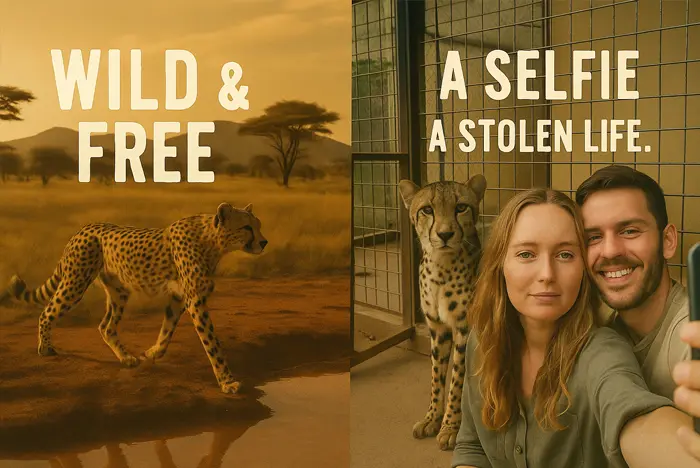
You're told it's a once-in-a-lifetime chance: a photo with a real cheetah. You sit beside it, grin wide, and snap the shot.
But behind the lens, something's off. The world's fastest land animal shouldn't look this still… or this sad.
Across Southern Africa, "cheetah encounters" are marketed as educational or conservation-friendly. You're promised a personal experience, often including petting, walking, or posing with a cheetah.
The reality? These are highly stressed, captive animals, frequently drugged or conditioned through fear.
Cheetahs are not domesticated. They are shy, solitary creatures that rely on stealth, silence, and space. Being dragged into photo ops or tourist walks is pure torment — not enrichment.
To keep cheetahs compliant for photo sessions, handlers often raise them from birth in isolation, strip them of natural instincts, and limit their movement.
Their stress levels spike. Their lifespans shorten. They lose the very behaviors that make them cheetahs.
Even worse, these setups often claim to support conservation — but captive cheetahs used for selfies are rarely, if ever, reintroduced into the wild.
What tourists think is helping, is actually hurting.
Want to see a cheetah in its element? Head to Kgalagadi Transfrontier Park, Kruger, or other wildlife areas where these sleek hunters roam free — no leash, no show, no stress.
Or back conservation centers that focus on habitat protection, breeding, and wild behavior restoration, not photo sessions.
Let cheetahs be what they were born to be: Fast. Free. Untouched.
Wild Shows, Trapped Lives: The Circus of Misery
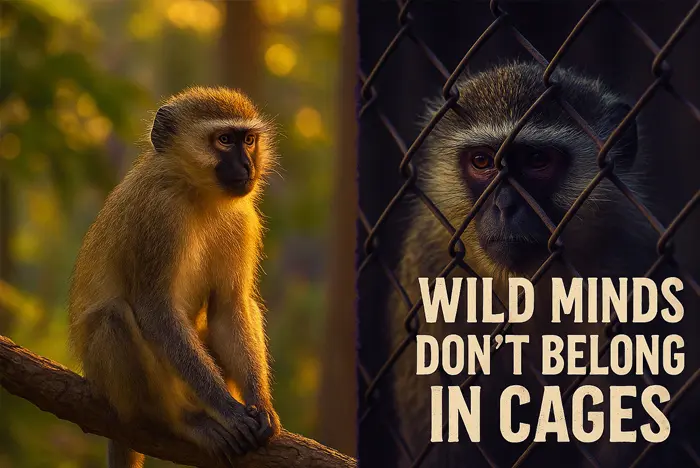
The music plays. A monkey rides a bicycle. A parrot solves a puzzle. The crowd laughs. Applauds.
But none of these animals are smiling.
Behind every performance is a life stolen from the wild — bent to human will, boxed into tricks, and robbed of meaning.
From roadside attractions to wildlife parks and "edutainment" shows, South Africa — like much of the world — still hosts venues where animals are trained to perform.
Snakes "dance," parrots count, monkeys jump through hoops. These shows often market themselves as family fun or educational — but the reality is simple: animals are made to entertain, not be themselves.
Training is rarely kind. Confinement is the norm. And the message to audiences? That wildlife exists to serve us.
To get wild animals to behave like circus acts, trainers often use fear, punishment, food deprivation, and unnatural isolation.
Monkeys are incredibly intelligent and social — yet in these shows, they are dressed, leashed, and made to repeat degrading routines. Birds, meant to soar across continents, spend decades in cages between brief moments on stage.
Even if the tricks seem harmless, the lives behind them are not.
South Africa offers some of the best natural animal spectacles in the world — no training required.
Want to be amazed? Watch a murmuration of starlings dance across the Karoo sky. Spot vervet monkeys swing from trees in the wild. Listen to the call of a fish eagle echo across a river.
Animals don't need scripts. They were born to be wild.
Entertainment ends when the applause fades. But for the animals, the cage stays shut.
If you truly love wildlife, don't clap for captivity. Clap for freedom.



